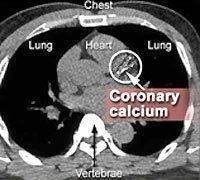Those that did not attend the Castleview Hospital Lunch and Learn for the month of March missed out on the opportunity to be educated on the topic of calcium scoring in the heart. This is a test that is conducted in the hospital and assesses the buildup of calcium in a patient’s arteries. Chronic buildup is associated with the amount of cholesterol that already exists in arteries.
The recommended age to begin a test such as this is ages 45 to 75, with no previous cardiovascular disease. During the test, a check for a burden of cholesterol in a patient’s artery is prudent to conduct as buildup will create inflammation in the arteries. The body’s natural way of combating this is to lay down calcium within the artery. The buildup causes chest pain or discomfort, known as angina.
The testing is prudent to conduct and handle due to the fact that if the plaque ruptures, a blood clot can form on the surface. A large blood clot can mostly or completely block blood flow through a coronary artery. This is the most common cause of a heart attack. Over time, ruptured plaque hardens and narrows the coronary arteries. Those with an intermediate (5% to 20%) 10-year risk would be most likely to benefit from the coronary artery calcium (CAC) scoring.
The presence of CAC is a specific marker of atherosclerosis in the body. The testing provides the most accurate insight of personal risk. Some of the indicators and risk factors are a total cholesterol over 200, bad cholesterol over 130 and good cholesterol below 40. High blood pressure, diabetes, smoking, a history of blocked arteries, history of stroke or family history of premature coronary disease are also risk factors.
Scoring guidelines range from 0 (no identifiable plaque) up to 401 or higher, which is extensive. A risk of coronary disease starts at less than 5% and goes up to high likelihood of at least one significant coronary narrowing. Going online and visiting the heart risk calculator can help a patient discover their risk. It is suggested that all over the age of 35 learn their scores whether on their own or by visiting a physician.
Studies show that nearly 45% of people that have a heart attack do not show signs beforehand. After age 65, more women than men have high blood pressure and the prevalence of hypertension among African Americans in the U.S. is among the highest in the world. Studies have also shown that more women than men die of stroke and have the unique risk factors including pregnancy, hormonal therapy and greater risk of hypertension.
Women are just as likely to be non-adherent to medical therapies as men and a routine use of aspirin in healthy women under 65 is not recommended for primary prevention of myocardial infarction. If you wish to have a test conducted for calcium scoring, call or visit Castleview Hospital.

